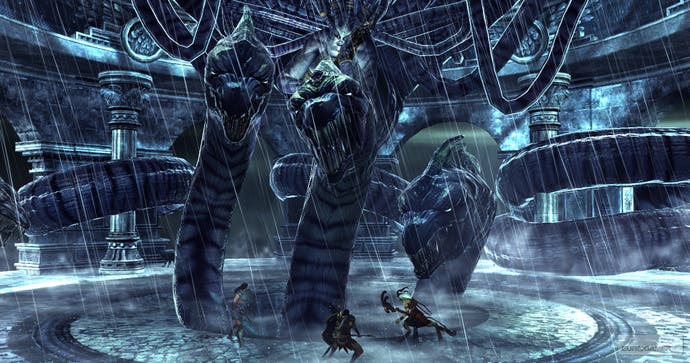Rise of the Argonauts
Greeks bearing gifts.
What do RPG fans want? Rise of the Argonauts' lead designer Charley Price believes they want a strong, customisable character with choices to make. And beyond that, it should be simple. Price says he's been busy "discarding the baggage of Dungeons & Dragons" for Argonauts - due out on PC, PS3 and 360 later this year - because it's laborious and repetitive. There's no juggling inventory items, no health or mana bars, no levelling up, XP or grind, and menus are few. This is a third-person action-RPG built on Unreal Engine 3. And Argonauts doesn't stop at reinterpreting the genre; it also wants to resurrect Ancient Greece.
Yes, we're back in the world of muscle-men, women with snakes on their heads and squabbling gods, ala Jason and the Argonauts - the film upon which the game's loosely based - and Price is obsessed by it all. You'll visit Delphi, the island of Apollo, for instance, and fight your way from the dark base of a mountain to the sun-drenched summit, signifying a journey from ignorance to enlightenment. "In many ways it's the foundation of literature, of drama," Price says of Ancient Greece. "It's this awesome fantasy setting that already has this street credibility in a literary perspective." Medusa perhaps best personifies the reinterpretation, with great snakes many times the size of Jason and his companions filling the screen and trying to eat you up. Even when the game adds a touch of dramatic licence it's paid for in good gameplay.
You, meanwhile, start off by fitting yourself into the sandals of the kingly Jason, and begin on your wedding day as bride-to-be Alceme is assassinated, before thundering through the usually-serene pastoral island of Iolcus in pursuit of the murderer. Once you get your revenge, you carry Alceme to the mausoleum and seal yourself in there for days. Eventually you emerge and undertake a quest to find the fabled Golden Fleece, which legend says can bring the dead back to life. You seek out your old friend Hercules to assist, and prepare to right the wrongs of the dark titan Hecate and his Blacktongue cult assassins on the way.

In all you'll visit seven islands on your quest (plus a couple of extras) and each should take two hours to conquer with the help of your Argonaut pals. Hercules is joined by Achilles, Pan and Atalanta, among others, and although they fight for themselves they also have specific skills and react to your plight. Hercules begins to grapple and expose enemies when you are close by so you can plunge something sharp and pointy into them, for example. Since we're in RPG-land, your Argonauts also have their own stories, and they chime in and add their thoughts to conversations or offer information on an area you're exploring. Dialogue is handled in a Mass Effect style, with multiple options branching out from a circle that shows the symbol of the god each decision favours.
Back to the start, though, and the opening doubles as a tutorial so you're immediately in the action grasping the basics. Not only are you a king but you're also a renowned warrior, so forget about punching rats - you've got a fast sword, a long-reaching chuckable spear, a mace and your shield, which is a symbol of your legend. Face buttons perform light (wounding) and heavy (execute) attacks, wave the shield and let you dodge, while triggers sprint and block, which moves your shield to meet blows from multiple angles.
Combos let you change pace and severity, and switch weapons mid-attack. At the core of the combat is Price's vision of "lethality": stab at an unprotected body part and you will injure or kill someone. There's a clever procedural animation system that works out what is hitting where and what the result should be, and this has a wonderfully random charm to it: bodies are chopped in half, torsos impaled, heads sent rolling - by your shield more often than not. Generally baddies increase in difficulty by learning how to block or dodge or parry, rather than by being given more hit points or higher levels. Bosses are harder to despatch, with multiple phases.


.png?width=291&height=164&fit=crop&quality=80&format=jpg&auto=webp)




.jpg?width=291&height=164&fit=crop&quality=80&format=jpg&auto=webp)
